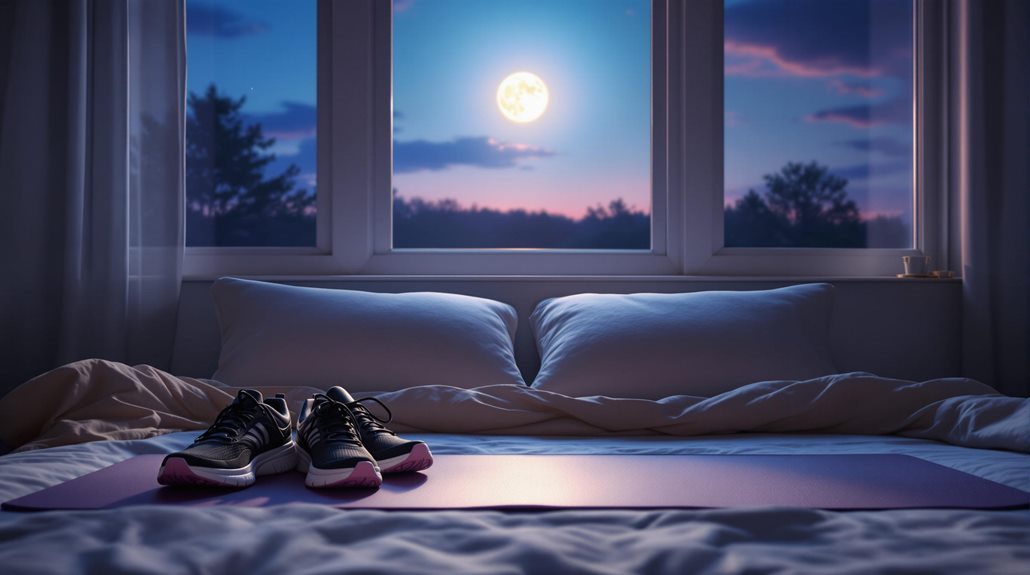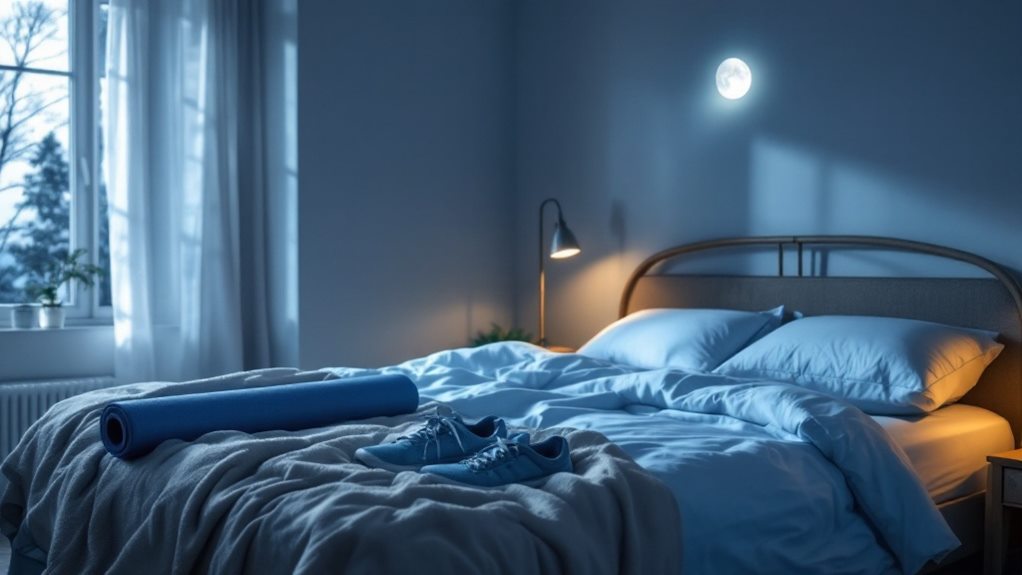
Regular exercise enhances your sleep quality by boosting melatonin production, which regulates your sleep-wake cycle. It reduces cortisol levels, easing stress and anxiety that can interrupt your rest. Physical activity also releases endorphins, promoting relaxation and mood stabilization, making sleep more restorative. Aerobic exercise, in particular, increases deep sleep, crucial for body recovery. Timing your workouts right—opting for morning or early afternoon sessions—can maximize these benefits. Engaging in regular exercise helps manage sleep disorders like insomnia and obstructive sleep apnea. Discover more about how exercise choices and routines can deeply impact your sleep quality and overall well-being.
The Science Behind Exercise and Sleep
When you incorporate regular exercise into your routine, it greatly impacts the quality of your sleep. Physical activity boosts melatonin production, which is vital for maintaining a healthy sleep-wake cycle and helping you fall asleep faster. Not only that, but regular exercise can also reduce cortisol levels, so you’re less stressed, which in turn cuts down on anxiety-driven sleep disturbances.
Engaging in aerobic exercise, even just 30 minutes of moderate-intensity, enhances deep sleep, also known as slow-wave sleep. This sleep stage is essential for mental and physical recuperation, allowing your brain to rejuvenate. Think of it as a natural recovery process that leaves you feeling refreshed and alert the next day.
Exercise also promotes sleep hygiene by stabilizing your mood. Those endorphins released during physical exertion aren’t just for instant after-workout happiness. They lead to improved relaxation and set you up for a peaceful night’s rest.
With less anxiety on your plate, thanks to these mood boosters, your overall sleep quality improves. So, weaving exercise into your day not only acts as a boon for your health but also enhances your nightly slumber.
Hormonal Changes From Physical Activity
Through regular physical activity, your body’s hormonal landscape experiences a positive alteration that directly benefits sleep quality. One significant change is the increase in melatonin production. This hormone is essential in regulating your sleep-wake cycles, making sleep onset easier and enhancing overall sleep quality.
Furthermore, engaging in exercise can contribute to preventing weight gain by increasing physical activity levels, which is beneficial for overall wellness. Engaging in exercise also decreases cortisol levels, the hormone associated with stress. Lower cortisol levels lead to reduced stress, aiding in better relaxation and minimizing sleep disturbances.
Physical activity doesn’t just stop there; it boosts the production of endorphins as well, which are known for their mood-enhancing properties. This reduction in anxiety and improved mood are directly linked to better sleep outcomes.
Additionally, exercise helps balance serotonin levels. Serotonin plays an integral role in sleep regulation and mood stabilization—both essential for maintaining healthy sleep patterns.
The hormonal changes from physical activity promote enhanced muscle relaxation, which supports quicker sleep onset and shifts into deeper sleep stages. These benefits highlight the seamless interaction between exercise and hormones, improving not just how quickly you fall asleep but also the quality and depth of your rest.
Through these mechanisms, regular exercise lays the foundation for more invigorating and restorative sleep.
Role of Endorphins in Relaxation

Understanding the relationship between exercise and hormones sets the stage for exploring how endorphins enhance relaxation. During physical activity, your body releases endorphins, neurotransmitters that promote euphoria and relaxation. These feelings help you manage stress and anxiety, improving your overall mood.
Regular exercise boosts endorphin production, creating a greater sense of well-being, which eases sleep onset and enhances sleep quality. Elevated endorphin levels after exercise also help reduce cortisol, the stress hormone. High cortisol is detrimental to sleep patterns, so reducing its levels supports better sleep experiences.
You’ll find that when stress and anxiety are lessened, falling asleep becomes easier, potentially reducing insomnia symptoms. Moreover, endorphins have another vital function: they help diminish your perception of pain. This effect promotes additional relaxation and comfort, conditions that are conducive to restful sleep.
Research highlights that those regularly engaging in physical activity report higher endorphin levels, which correlate with improved sleep quality and fewer insomnia issues.
Timing Your Workouts for Sleep
To optimize your sleep quality, consider the timing of your workouts carefully. Engaging in morning or early afternoon exercise is ideal, as it tends to enhance sleep better than evening sessions.
If you prefer evening activities, stick to light exercises like yoga, and avoid intense workouts right before bed to prevent sleep disruptions.
Optimal Exercise Timing
Aligning your workout schedule with the body’s natural rhythms can greatly enhance sleep quality. Exercise timing plays a significant role in balancing ideal health and the quality of sleep you enjoy. Regular exercise, when timed right, works in harmony with your circadian rhythms and sleep-wake cycle. For instance, a morning or early afternoon workout not only keeps your core body temperature in check but also guarantees your aerobic workouts contribute positively to your night’s rest.
Here’s a quick overview of the key considerations for exercise timing:
| Time of Day | Recommendations |
|---|---|
| Morning | Ideal for high-intensity workouts |
| Early Afternoon | Aligns with natural circadian rhythms |
| Early Evening | Opt for light aerobic workouts, like yoga |
| Late Evening | Avoid high-intensity or aerobic workouts |
| Individual Variations | Test timing based on personal responses |
However, individual responses differ. While evening exercise may disrupt some people’s sleep, others might not experience any adverse effects. If you’re one of those who enjoy evening sessions, light activities like yoga could help you relax and prepare for a restful night. Personal experimentation is key to determining what suits your body and enhances your sleep the most.
Evening Routines Impact
For many, the evening is a preferred time to unwind and engage in physical activity. To optimize your sleep quality, understanding the timing of your evening workouts is essential. Exercising vigorously less than an hour before bedtime can raise your heart rate and body temperature, disrupting sleep.
Instead, consider finishing your exercise session at least 90 minutes before sleeping. This allows your body adequate time for relaxation and to stabilize its physiological functions.
While vigorous night exercises may affect some people’s sleep efficiency, moderate evening workouts often don’t have this downside and may even enhance relaxation. Activities like yoga can help you unwind, aiding sleep onset without negatively impacting overall sleep quality.
Keep in mind that personal responses to exercise timing differ; for some, a workout after 8 p.m. might lead to quicker sleep onset and deeper rest.
Listen to what your body needs, as exercise timing can greatly affect your sleep. Consistent early-day workouts usually offer better results, but if evenings are your time, ensuring your routine is moderate might help maintain or even improve your sleep quality and efficiency.
Pre-Bedtime Guidelines
Understanding how your evening routine influences sleep leads naturally to planning your activities wisely. Exercise plays an important role in determining sleep quality, and timing your workouts can make all the difference.
If you’re thinking about squeezing in a session pre-bedtime, it’s vital to allow 1-2 hours for those endorphins to settle. Doing aerobic workouts less than an hour before bed can raise your core body temperature and heart rate, making sleep elusive. Instead, opt for light evening activities like yoga or stretching to encourage relaxation and improve sleep efficiency.
Engaging in moderate-intensity exercise in the late afternoon or early evening is often beneficial. This timing can enhance sleep efficiency by promoting deeper, slow-wave sleep.
However, because individual responses to exercise vary, it’s important to experiment personally. Some people find late-night workouts invigorating rather than relaxing, so notice how your body reacts.
Optimal Exercise Types for Sleep

When considering the impact of various exercises on sleep quality, it’s important to identify the most effective types. Engaging in regular physical activity isn’t just beneficial for your health—exercise improves sleep too.
Moderate aerobic exercise, like brisk walking or cycling, has been shown to increase slow-wave sleep, which is significant for restorative rest. This, in turn, enhances overall sleep duration and quality, making it a staple for improving sleep quality.
High-Intensity Interval Training (HIIT) offers another powerful option. Studies indicate HIIT can increase total sleep time and efficiency, providing a thorough boost to your sleep routine.
Meanwhile, low-intensity exercises like yoga and stretching promote relaxation, which is critical for establishing good sleep hygiene. Performing these activities in the evening can lead to better circadian rhythms and improved relaxation.
Additionally, resistance training may suit some individuals better, with potential to enhance sleep quality even more than aerobic exercise.
Outdoor exercises are also remarkable, as they expose you to natural light, aiding in the regulation of circadian rhythms.
Selecting the right exercise type depends on your preferences and lifestyle, but incorporating these effective strategies will certainly assist your quest for restful nights.
Managing Sleep Disorders With Exercise
After exploring the ideal types of exercise for boosting sleep quality, it’s important to recognize how regular physical activity can also manage sleep disorders effectively.
Exercise acts as a powerful non-pharmacological intervention that can enhance your sleep quality and alleviate common sleep disorders like insomnia and obstructive sleep apnea (OSA). For instance, engaging in exercise often mirrors the effectiveness of prescription medications in treating insomnia, leading to better overall sleep.
Additionally, understanding the role of estrogen levels in exercise can optimize sleep quality, especially for female athletes. Here’s how you can utilize exercise to tackle sleep disorders:
- Aerobic Exercises: Participate in activities like jogging or cycling to improve sleep patterns. These exercises increase total sleep time and decrease the time it takes to fall asleep, especially for those struggling with sleep disorders.
- Resistance Training: Incorporate weight lifting into your routine. This type of exercise can be particularly effective for older adults, enhancing sleep quality more than aerobic exercises.
- Regular Physical Activity: Aim for consistency in your workouts. This regularity can considerably reduce the symptoms of OSA, helping roughly 60% of individuals with moderate to severe cases.
- Holistic Well-being: Consider exercise as part of your overall health regimen. It not only tackles sleep disorders but also boosts your day-to-day energy.
Building Consistency for Better Sleep

You can improve your sleep by sticking to a regular exercise routine each week.
Focus on timing your workouts consistently, like in the morning or early afternoon, to align with your body’s natural rhythms. Staying hydrated is also essential as adequate hydration supports energy levels and prevents fatigue, both of which can contribute to better sleep quality.
Consistent Exercise Benefits Sleep
Establishing a consistent exercise routine can greatly improve your sleep quality by promoting stable circadian rhythms and more restful nights.
When you engage in 150 minutes of moderate-intensity physical activity weekly, studies show it can considerably enhance sleep quality. This commitment to a routine helps improve sleep health by regulating your body’s internal clock, leading to a more consistent sleep pattern and increased sleep efficiency.
You’ll find yourself falling asleep faster and enjoying more restorative sleep with less nighttime disruptions. Additionally, the psychological benefits of exercise, like reduced anxiety and a better mood, contribute to a calmer state that’s ideal for achieving quality sleep.
Here’s how consistent exercise benefits your sleep:
- Improved Sleep Quality: By incorporating regular physical activity, you decrease the time it takes to fall asleep and increase total sleep time.
- Enhanced Circadian Rhythms: Your regular exercise guarantees your sleep cycle stays steady, promoting healthier sleep habits over time.
- Boosted Sleep Efficiency: You’ll experience less wakefulness at night, enhancing the restorative nature of your sleep.
- Reduced Anxiety: Exercise reduces stress levels, providing a calming effect that helps set the stage for restful nights.
Daily Habits for Rest
Developing daily habits that promote restful sleep is essential for overall well-being. To improve your sleep quality and reduce daytime sleepiness, consider establishing a regular exercise routine. Aim for at least 30 minutes of moderate aerobic activity five days a week. This not only enhances sleep but also helps regulate your circadian rhythms, leading to more consistent sleep patterns.
You should be mindful of when you exercise. Engaging in physical activity during the morning or early afternoon tends to improve sleep quality more than late-night workouts.
Tracking your exercise habits can reveal which routines work best for you. By keeping a workout diary, you’ll identify the ideal routines that grant you better rest. Regular physical activity should be paired with good sleep hygiene. Avoid caffeine and heavy meals before bedtime to further support improved sleep outcomes.
Incorporating these habits into your daily life won’t just contribute to better sleep; it also enhances your overall health. By being consistent in your approach to exercise and sleep, your body will adapt, leading to improved mood, increased energy, and a more alert, refreshed you each day.
Final Thoughts
You might think exercising will make you too energized to sleep, but that’s not the case. By engaging in regular physical activity, you’ll balance your hormones, boost relaxing endorphins, and regulate your body’s internal clock. To get the best sleep benefits, choose the right type of exercise and time it appropriately. Even if you’re managing a sleep disorder, consistency in exercise can improve your sleep quality. Embrace these changes and enjoy restful, rejuvenating nights.














